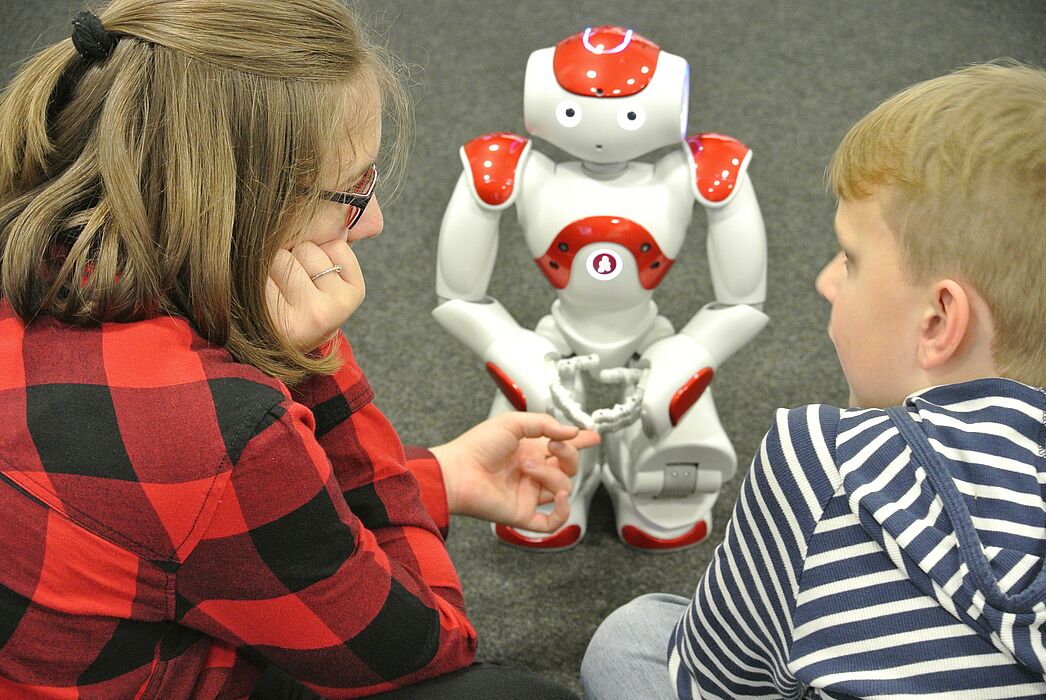1 June is International Children's Day. To mark the occasion, Prof Dr Katharina Rohlfing, spokesperson for the Collaborative Research Centre TRR 318 at Paderborn University and Bielefeld University, will be speaking about artificial intelligence (AI) in children's and young adult literature.
If you enter "AI in children's books" into an internet search engine, it presents a multitude of results showing how anyone can use artificial intelligence to create a children's book designed according to their own wishes. However, the actual topic of AI is still rarely represented in children's and young adult literature. Yet the youngest members of today's society are already growing up in the almost everyday company of voice assistants, chatbots and assistance robots. Wouldn't it therefore make sense to integrate these topics into texts and stories for children? Katharina Rohlfing, Professor of Psycholinguistics at Paderborn University and spokesperson for the SFB/TRR 318 "Constructing Explainability", explains in an interview why the topic can also set important accents in children's and young adult literature. She herself is involved in several children's book projects that are about to be published.
Why is the topic of artificial intelligence relevant in children's and young adult literature today?
Rohlfing: This topic is important because technology is part of childrens’ lives. There is no way around it: washing machines, dishwashers, coffee machines, cars are determining our doings. Even though we conceive childhood as a period of life with a focus on exploration and learning, it does not happen in a different world. Literature is addressing the world surrounding us: our concerns, values, challenges. Surprisingly, even though there is some children’s literature on technology (explaining some technological issues) or about technological companions such as robots, the offered motif is quite limited: A robot, for example, is mostly introduced similarly to an alien coming from a different planet that needs support or explanation for navigating in the human world. However, our technological advances are about robots that actually assist humans. What the challenges of this assistance are and how it changes our relationships and our expectations, should also be of topic to children. This way, they can reflect on it, talk about it, and hopefully develop smart ideas about how to shape it.
Opinions differ on the interaction possibilities between humans and AI. Ultimately, it is important to show children and young people a range of options for dealing with AI?
Rohlfing: It is important to communicate to children that technology does not need to be taken for given. Humans develop technologies, can consider them as useful or decide not to use them, and can shape them. This is especially important facing current rapid technological developments: as members of society, we have little time to critically reflect what the (new) technology is influencing and whether we will cope with the changes. Recently, with the introduction of the ChatGPT, some developers and scientists requested half a year of reflection and a stop of further developments. Whereas it seems impossible that everybody will comply with such a suggestion, the general idea to have more and deeper discussions on the technological developments is essential for a democratic society.
In the Transregio, the scientists are researching the co-construction of understanding, among other things. Is it important to sensitize young readers to this perspective-based, constructive collaboration with AI systems?
Rohlfing: I am very proud of these books, that will be published soon, because they nicely depict the idea of how difficult it is to adapt to an interaction partner and to construct a meaningful and enjoyable event together! This is basically what we mean by “co-construction”. It seems so natural, and humans can do it without a lot of effort—even children are experts on it. But for a technological companion, such as a robot, it requires a lot of knowledge about our world, actions, values, etc. The books show nicely where the challenges and current limits are.
The Transregio offers workshops for school classes to explore AI topics. To what extent do AI topics in children's and youth literature offer a good complement to this?
Rohlfing: Workshops for school classes offer an experience of and with AI. This is great but requires a lot of advanced cognitive and language capabilities. Children’s literature has the property to consider and adjust to children’s language and cognitive capabilities. The books about AI tell a story and offer an example of usability and its difficulties. For young children, it can provide an occasion to talk about and reflect it. This can be a first access to critical technological thinking.


